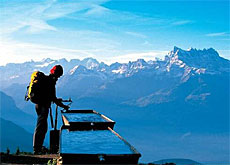
Switzerland cold-shoulders Alpine Convention

Switzerland – situated at the heart of the Alps – has signed the Alpine Convention on protecting the region’s delicate ecosystem. But, unlike most other signatories, it has yet to ratify the framework protocols.
Now parliament is preparing to revisit the Convention, which entered into force in 1995.
Switzerland signed the agreement in 1991, along with Austria, France, Germany, Italy, Liechtenstein and the European Union. Slovenia and Monaco joined later.
After lengthy consideration, the parliamentary commission for the environment recommended in April that Switzerland ratify the protocols on transport, soil conservation, and land use planning and sustainable development. Parliament is due to vote on the matter this week.
No understanding
Other signatory states have ratified the protocols without a murmur, and struggle to understand Switzerland’s reservations.
“What exactly is going on?” was the question recently asked by members of the International Commission for the Protection of the Alps (Cipra).
“Why is Switzerland intending to ratify only three of the nine protocols to the Convention?”
Parliament has advised putting the remaining six protocols on hold. This means the time-consuming process of preparing the Alpine Convention for parliament, which began in 1999, is not yet over.
Some conservative parliamentarians have taken issue with the content of the Convention, fearing too much attention is being paid to ecological aspects at the expense of the economy.
“This is a position which is simply not understood outside Switzerland,” points out Reto Solèr, head of Cipra Switzerland.
“Just look at Austria, a country that is similar to our own. The Austrian parliament accepted the Convention and the protocols without a single vote against!”
A good 60 per cent of Switzerland, corresponding to 25,000 square km, is within the area governed by the protocols that set out specific measures for protecting the Alpine region.
Given that such a large part of the country would be covered by the protocols, it is understandable that the Swiss authorities want to analyse in detail their likely effect.
On the other hand, given its location at the heart of the Alps, Switzerland must be prepared to work with its neighbours to preserve the natural environment.
High standards
It is true that Swiss environmental standards are already quite high.
“So much so that the standards laid down in the protocols do not exceed what is already in force in Switzerland,” stresses Solèr, quoting a government statement from December 2001.
Why then is it so important that Switzerland should follow in the footsteps of Austria, Germany, Slovenia and Liechtenstein? (Italy, France and the Principality of Monaco have not yet accepted the protocols in full).
“The strength of the Convention lies in its international nature,” replies Solèr.
The agreement was born out of the alpine countries’ need to consider this region as something unique, to be protected in its entirety by creating minimum common standards.
“A single country cannot do very much,” says Solèr. “Faced with transit traffic and over 100 million tourists who come to spend their holidays in the alpine region, we need an internationally coordinated approach.”
The Swiss government and governments of the alpine cantons have all in the past called for full ratification of the protocols.
The government points out that this option would not entail any changes to Swiss law. But this opinion is contested.
Defending liberty
“The task of the parliamentary bodies is not to place faith in the federal or cantonal governments,” retorts Carlo Schmid of the commission for the environment.
“Many of the protocols, which we have analysed in detail, would take precedence over Swiss law, resulting in new federal decrees,” adds the Christian Democrat member of the Senate.
“Indeed, by ratifying these standards and the subsequent international treaty, we would lose our legislative freedom: if the population one day wanted to modify our environmental laws they would be unable to do so.”
This is a possibility that the more conservative and least internationally minded wing in parliament doesn’t like at all.
Competitive advantages
Paradoxically, standardisation of ecological and social standards at the alpine level could bring Switzerland competitive advantages.
Certain countries, such as Italy or France, would have to tighten up their laws on protecting their own alpine territory.
“I really don’t understand the strong opposition that has arisen in Switzerland,” concludes Reto Solèr.
“It’s a theoretical question: and freedom is always a theoretical question,” replies Schmid.
swissinfo, Marzio Pescia
All the signatory countries have ratified the framework Convention.
Austria, Germany, Slovenia and Liechtenstein have also ratified the implementing protocols.
Italy and France seem set to ratify most of them.
By contrast, a Swiss parliamentary commission is proposing ratifying just three.
The Alpine Convention is an international treaty signed between 1991 and 1994 by eight Alpine countries.
The treaty comprises a framework convention, which sets out the basic principles, and nine protocols outlining measures to be implemented in other areas.
The aim of the Convention is to protect the Alpine ecosystem and guarantee its sustainable development over the long term.
It also strives to protect the economic and cultural interests of the people who live in the alpine region.

In compliance with the JTI standards
More: SWI swissinfo.ch certified by the Journalism Trust Initiative




























You can find an overview of ongoing debates with our journalists here . Please join us!
If you want to start a conversation about a topic raised in this article or want to report factual errors, email us at english@swissinfo.ch.